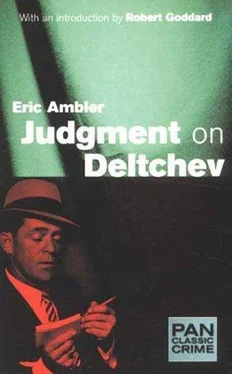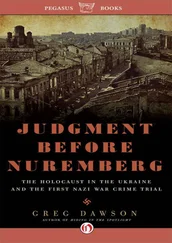Eric Ambler - Judgment on Deltchev
Здесь есть возможность читать онлайн «Eric Ambler - Judgment on Deltchev» весь текст электронной книги совершенно бесплатно (целиком полную версию без сокращений). В некоторых случаях можно слушать аудио, скачать через торрент в формате fb2 и присутствует краткое содержание. Год выпуска: 1977, ISBN: 1977, Издательство: Vintage, Жанр: Криминальный детектив, на английском языке. Описание произведения, (предисловие) а так же отзывы посетителей доступны на портале библиотеки ЛибКат.
- Название:Judgment on Deltchev
- Автор:
- Издательство:Vintage
- Жанр:
- Год:1977
- ISBN:9780307049971
- Рейтинг книги:4 / 5. Голосов: 1
-
Избранное:Добавить в избранное
- Отзывы:
-
Ваша оценка:
- 80
- 1
- 2
- 3
- 4
- 5
Judgment on Deltchev: краткое содержание, описание и аннотация
Предлагаем к чтению аннотацию, описание, краткое содержание или предисловие (зависит от того, что написал сам автор книги «Judgment on Deltchev»). Если вы не нашли необходимую информацию о книге — напишите в комментариях, мы постараемся отыскать её.
Judgment on Deltchev — читать онлайн бесплатно полную книгу (весь текст) целиком
Ниже представлен текст книги, разбитый по страницам. Система сохранения места последней прочитанной страницы, позволяет с удобством читать онлайн бесплатно книгу «Judgment on Deltchev», без необходимости каждый раз заново искать на чём Вы остановились. Поставьте закладку, и сможете в любой момент перейти на страницу, на которой закончили чтение.
Интервал:
Закладка:
‘I’m not driving up to the entrance,’ he said curtly, ‘you can get out here.’
‘All right.’
The moment I was out of the car he slammed the door and drove off. I could see his point. If Aleko’s men were waiting at the hotel for me, it would not be a good place to stop. I turned the corner and paused. There was a police van outside the hotel entrance. I walked slowly toward it. The revolving doors were set back slightly, and as I approached I saw the sleeve of a uniform in the recess. I walked on more boldly. If the police were there, there would at least be no gunmen in ambush.
I reached the entrance and went in, stared at by the policeman. Inside the foyer there was a group of military police and the night clerk in his shirt sleeves. They seemed to be questioning him. Then, as I came through the revolving doors, they all looked at me. The night clerk pointed.
‘Herr Foster,’ he said.
An officer stepped forward and two of his men moved round behind me.
‘Your papers please?’ He spoke in German.
I fumbled them out somehow. My hands were trembling. He glanced at them, pulled my jacket open to see if I had a gun, then nodded to the men behind me. ‘You are under arrest,’ he said to me as the escort closed in. ‘You will come with us.’
I turned round and walked toward the revolving door again. I just managed to get through it before, very violently and painfully, I vomited.
I sat with the escort on benches in the van. The officer locked us in and got up beside the driver. I did not see where we went. It was not far. I managed to recover sufficiently to ask what I was charged with, and found that the escort spoke no German. The van turned onto cobbles and stopped. I heard the officer get out. Then there was silence. We stayed there for about ten minutes. When the van was stationary, the roof ventilators did not revolve and soon the air inside became warm and stagnant. I could smell the uniforms and greased-leather equipment of the escort and their sour, wine-laden breaths. At last there were footsteps on the cobbles, and the door of the van opened. The officer shone a flashlight.
‘Get out.’
The escort clambered down and I followed. We were in a quadrangle with a high entrance arch. On the three other sides the space was enclosed by a building with barred windows. A prison, I thought. The only light came from a narrow doorway near the van.
‘Forward!’
Going toward the doorway I stumbled on the cobbles and one of the escorts held me by the arm. I shook his hand away and went inside. There was a long stone passage with the smell of a barracks about it. Led by the officer, we marched along the passage and up some stone stairs. Then there was another passage and more stairs. The place was certainly not a prison. At the end of the second passage there was a wooden door with a guard on it. As we approached he unbolted the door. The officer went through ahead of us, and the ring of his footsteps was suddenly muted. The corridor we now entered was carpeted. We walked on between heavily ornamented walls reaching up to a vaulted ceiling. At intervals there were marble pedestals with busts standing on them and gilt wall brackets with electric candle lamps. There were no doors. Before we reached the end of the corridor, however, we turned off into a narrow passage like the alleyway of a liner. Then there were several doors. The officer peered at each in turn, then opened one of them and motioned me in.
It was evidently a committee room. There was a long table with a dozen or so chairs placed round it, a table with a telephone, and a bookcase. Over the rich marble fireplace there was a portrait of Vukashin in a gilt frame draped with the national flag. There were green linen blinds over the windows, and beside the fireplace a curtained door. The room smelt of stale cigarette smoke.
The door by which I had entered shut behind me and I heard the key turn in the lock. I turned round and found that I was alone. I looked at the time. It was two o’clock. I sat down at the table. My head was aching and there was a horrible taste in my mouth. There was a water carafe and glass on the table in front of me. I drank some of the water. It was strongly chlorinated and made me want to be sick again. I lit a cigarette. Minutes went by. Every now and then I would hear a movement or a cough from the passage outside. The escort was still there. When I had finished one cigarette, I lit another. If I were going to be put into a jail, my cigarettes would certainly be taken away. I might as well smoke while I could. However, this feeble effort at a philosophical approach to the situation was not successful. Whether or not I had cigarettes to smoke would probably not seem of much importance in the near future. If Sibley was right — and I knew that he was — my arrest could mean only one thing: that Aleko, having failed to kill me himself, had left me to be dealt with by his employers. It was not a pleasant thought. On the other hand, the party might have decided that to murder a foreign journalist would not be a wise move at a time when they would be busy denying their guilt of a more serious crime. But supposing their wisdom was of a different kind. Supposing they decided that the inconvenience of killing somebody who knew too much was as nothing compared with the inconvenience of being revealed as the accomplices of their leader’s murder. Death seemed very near at that moment. I hoped it would come mercifully. Perhaps if the hand were that of Aleko-
I turned sharply, my heart pounding, my skin crawling. The curtain over the door on the far side of the room had moved.
I stood up. The fantastic thought went through my mind that if I were going to be shot from behind the curtain, I must stand up so as to present an easy target.
The curtain moved again. A draught from somewhere had caught it. There was the sound of a door closing in the adjoining room, footsteps; then the door behind the curtain opened and a hand brushed the folds aside.
Brankovitch came into the room.
He glanced at me casually before turning to shut the door behind him; then he came round the table toward me.
‘Sit down, Mr Foster.’ He nodded to a chair and sat down himself facing me. His face was haggard and he needed a shave, but he did not look as if he had been roused from his bed. Probably he had been attending a meeting. The hours before a coup d’état that was to begin with an assassination would be busy ones for a propaganda minister. I must be one of the inevitable hitches.
He sighed. ‘A cigarette?’ He brought out a case.
‘I have one, thank you.’ This was idiotic. ‘I’m glad to find that you allow prisoners under arrest to smoke,’ I added.
He pursed his lips. ‘I think it will be better, Mr Foster, if you avoid facetious comment. You are being treated with great consideration, as I think my presence here indicates. It would be polite of you to recognize the fact. You realize, I hope, that you are in a very serious position.’
‘It’s difficult for me to realize anything, Minister. All I know is that I have been arrested and brought here. I should like to know what the charge against me is and I should like the British Legation informed.’
His dark, supercilious eyes stared at me coldly. ‘It would be convenient if you would abandon your pretence of innocence, Mr Foster. It wastes time. If you prefer to be treated as a common criminal, that can be arranged. If you will recognize the fact of my sitting here talking to you as evidence of consideration toward a distinguished foreign writer, we may make progress.’
I was silent.
He lit a cigarette. ‘Very well, then. Early tonight on the avenue that runs round the Presidential Park, shots were fired by two men at a third. Police pursued the men who had fired the shots. They escaped. So did the other man. But something was found by the police. A hat. It had your name in it, Mr Foster. Was it your hat?’
Читать дальшеИнтервал:
Закладка:
Похожие книги на «Judgment on Deltchev»
Представляем Вашему вниманию похожие книги на «Judgment on Deltchev» списком для выбора. Мы отобрали схожую по названию и смыслу литературу в надежде предоставить читателям больше вариантов отыскать новые, интересные, ещё непрочитанные произведения.
Обсуждение, отзывы о книге «Judgment on Deltchev» и просто собственные мнения читателей. Оставьте ваши комментарии, напишите, что Вы думаете о произведении, его смысле или главных героях. Укажите что конкретно понравилось, а что нет, и почему Вы так считаете.












